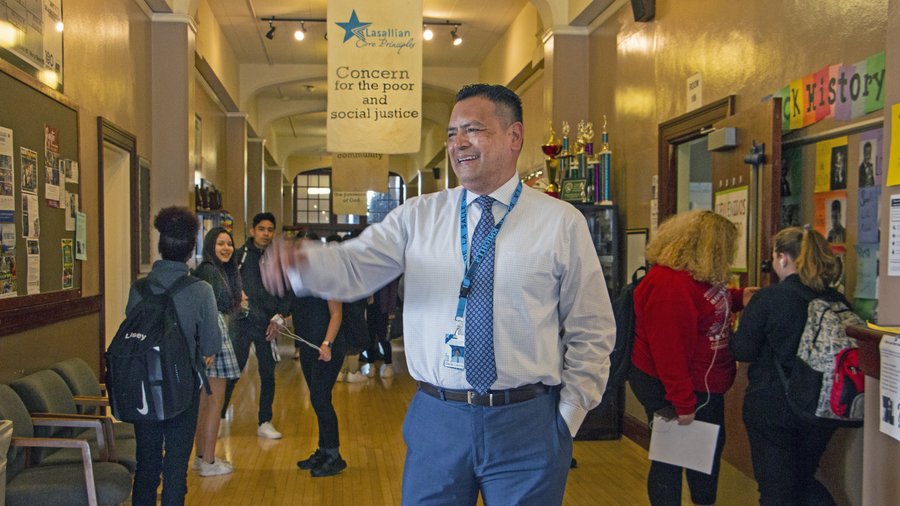See Correction/Clarification at the end of this article.
No one in Nikolas Tucker’s family has ever worked in an office.
As a child, the 23-year-old was interested in engineering and architecture, but he wasn’t sure what a career in those fields would look like.
Four years at De La Salle North Catholic High School changed that.
Tucker worked at both HDR Engineering and at Bora Architects while attending DLSNC. Today, he is a designer at Bora, a firm he returned to last year after graduating from Columbia University.
His educational journey not only helped solidify his career plans, it inspired other members of his family.
“It’s been more impactful for the older generation of my family,” Tucker said. “They saw me go through the process of college. My mom has become more ambitious. Seeing me in the office, she opened her own salon.”
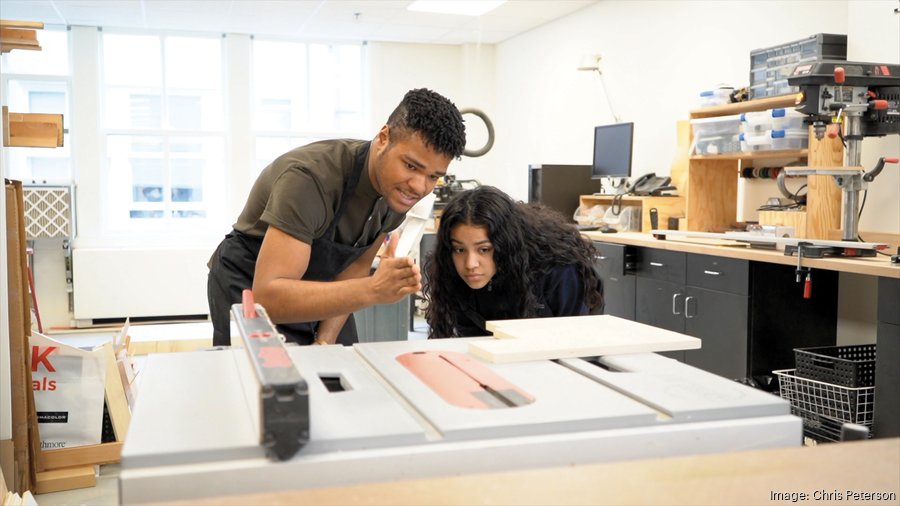
Tucker’s story is not uncommon for DLSNC graduates. Every student works at a Portland company throughout their high school career. Last year, 90 companies employed DLSNC students. Ninety percent of the school’s students are from communities of color; all are from families earning 75 percent below the average median annual income.
Even with a high percentage of students who might be deemed academically vulnerable, DLSNC outperforms Portland Public Schools. In June, 100 percent of DLSNC students graduated — compared to 80 percent for PPS last year — and all of them are planning to attend college.
Now, however, DLSNC is staring down two of the largest hurdles it’s faced since its founding nearly two decades ago. It is scrambling to adapt its work-study program to the realities of Covid and to offset revenue lost from a decline in partnerships. And it’s racing to get a new $20.5 million campus built before the lease on its current building expires next year.
Despite the challenges, President Oscar Leong sees opportunity. The racial reckoning sweeping the country has compelled companies to look inward and profess a desire to change. With a model that builds bridges between companies and communities of color, he said, De La Salle is an opportunity to make a meaningful difference.
“Not many cities across the country have this kind of powerful program,” Leong said. “I am hopeful that Portland at this time, in this crisis will reach out and partner with us.”
An A+ enterprise
Lisa Creamer stands in front of a giant regional map in an office just inside the entrance to DLSNC high school in North Portland. It’s March 5, and the map is stuck with dozens of push pins. Each pin represents the location of a DLSNC student working at one of the dozens of companies the school partners with each year.
Another wall is consumed by a matrix of class photos, company names, classes, and days of the week. It shows where every student is each day. Some are on campus, some at offices downtown or in the suburbs.
This is central command for Creamer, director of the school’s Corporate Work Study Program.
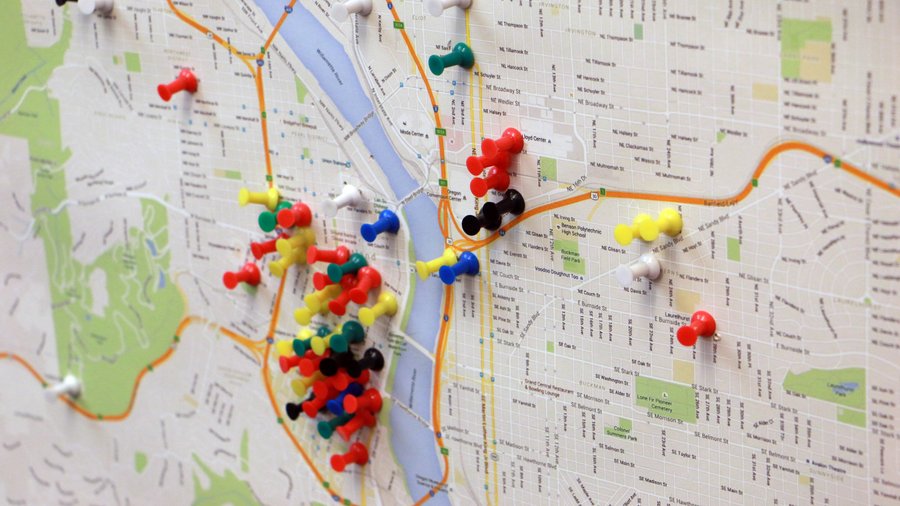
Modeled on a program created by Chicago’s Cristo Rey Jesuit High School, DLSNC opened in 2001. Today, it is part of a 32-school Cristo Rey Network. The school has 275 students though Leong wants to see that number grow.
DLSNC is like many other private schools. The academics are rigorous and the students are ambitious. There are some striking differences, though. For one, the average DLSNC family earns $44,000 annually, and 72 percent of students qualify for free or reduced lunch.
A DLSNC education costs $15,000 per student, according to the school. Tuition is $2,995 per year. Nearly 70 percent of students, however, attend on a full scholarship and no student who qualifies for admission is turned away. As a result, tuition accounts for just 7 percent of the school’s annual budget.
DLSNC's Corporate Work Study Program helps offset costs for students. Every student works five days a month at a Portland-area company. A team of four students — one from each grade — fills the equivalent of one full-time position. Corporate partners last year included Nike, Oregon Health & Science University, OnPoint Community Credit Union, Open Sesame, Bora Architects, Columbia Sportswear, Cambia Health Solutions, KinderCare, Friends of Trees, Metro and Schwabe, Williamson & Wyatt.
CWSP operates like a temp agency. Companies contract with the program to fill entry-level jobs. The money earned is paid directly to CWSP to cover about 50 percent of the cost for the student’s education. CWSP handles payroll and paper work — think W-4s and I-9s — trains students for office work and provides transportation. Each morning students on work duty take the MAX downtown to their jobs or pile into one of the school’s nine vans for transportation to offices in outlying areas.
“When they graduate, they will have a better resume than most college seniors,” Creamer said.
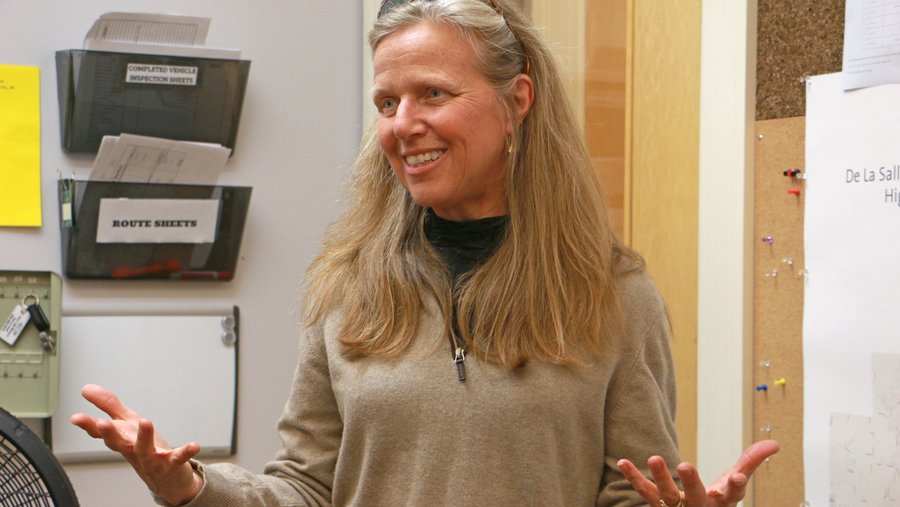
More than half of the school’s roughly $5 million operating budget comes from the CWSP.
The Covid-19 pandemic is testing those partner relationships. Creamer said about one-third of existing partners still don’t know if they’ll be able to participate in the school year that begins Sept. 1. That said, there have been some slivers of light. Six new partners have signed on during the pandemic.
‘Experiencing the briefcase’
When Leong, a Mexican-Chinese immigrant, was attending Cathedral High School in Los Angeles, one of his teachers asked him to close his eyes and describe what he saw for his future self.
“I see myself with a briefcase,” Leong recalls saying. He couldn’t say why exactly, only that he imagined the people working inside the high-rise buildings in downtown L.A. were carrying briefcases. As the son of a produce delivery driver and a homemaker, he didn’t know for sure. He had never walked those halls.
As principal of DLSNC, he leads a school full of students who come from similar backgrounds — with a very important difference.
“Our kids are experiencing the briefcase,” he said.
That was the case for Bora Architects’ Tucker. An elementary school project to build a model of Jamestown first sparked his interest in engineering and architecture. It was his experience through the CWSP that convinced him to ultimately pursue architecture.
“It was technical, but it was the art and creative side (that) I was not getting from engineering” that sealed the decision, Tucker said.
The work experience also elevated his communication skills, which helped prepare him for the interactions he had with professors at Columbia University.
“Looking at my peers, they were learning the expectations” of professional interactions he said. “I had had a boss and a supervisor before, and I knew how to reach out and communicate. I had a leg up.”
Tucker has come full circle. He’s working full-time at Bora and mentoring DLSNC students in the work-study program. He’s also working with the school on a number of projects, including the design of its new campus, a new maker space and a program for an elective class.
Isabella Steiner graduated from DLSNC in June. She credits her internship at online learning software maker OpenSesame with expanding her view of what it means to work in technology.
“When I thought of tech, I thought of the coding aspect,” she said. “I didn’t understand what a tech company is beside that. I saw what I was doing and how impactful it was to many people.”
Steiner spent two years at OpenSesame working across departments on spreadsheets, time-sensitive projects and even prepping the CEO for meetings. She also pitched and launched an internal newsletter to connect the interns to employees.
The work-study program gave Steiner, whose parents are both disabled and don’t work, insight into office life. Her colleagues also helped her with college applications — she was accepted to 17 schools and will attend Oregon State University.
OpenSesame has hosted two teams of students since it started participating in the program in 2018. It plans to host interns this year as well, despite the uncertainty around distance learning and work from home. The company’s nearly 150 employees have been working remotely since mid-March.
“We are not sure how it will work or play out,” said Josh Blank, co-founder and president of OpenSesame. The company did successfully run its college internship program over the summer. “We have been working as a company remotely for more than 20 weeks and on-boarded 15 employees that have never been in the office. We are confident we can (host DLSNC students).”

Students arrive to their internships with two weeks of training in professional conduct and the basics of Microsoft Office.
OpenSesame’s DLSNC interns rotate monthly through different departments in a typical year. Alex Hernandez, who runs the program, said the amount of support for students varies by grade level.
“It helps to have a structure in place that has check-ins and check-outs and tasks for downtimes,” Hernandez said. “We want them to be engaged.”
Companies need to be fully committed to making the program succeed, she said. It also helps to have a single supervisor take ownership of it.
Creamer and her team at DLSNC are focused on signing on more partners from the technology industry, which she said can help tech firms connect with local talent.
“Our students are a conduit for the pipeline,” she said. “After college, they come back home.”
The Bridge
Covid has put considerable strain on the DLSNC model. Many current and potential corporate partners are facing uncertain futures. Some are fighting for survival. It’s no surprise that the number of partnerships have declined.
It comes at a pivotal moment for the school. DLSNC broke ground in July on its new campus at St. Charles Parish at 5310 NE 42nd Ave. The plan is to move in by the fall of 2021, when the lease on the school’s current building on North Fenwick Avenue expires. (Scroll down to read more about the new school.)
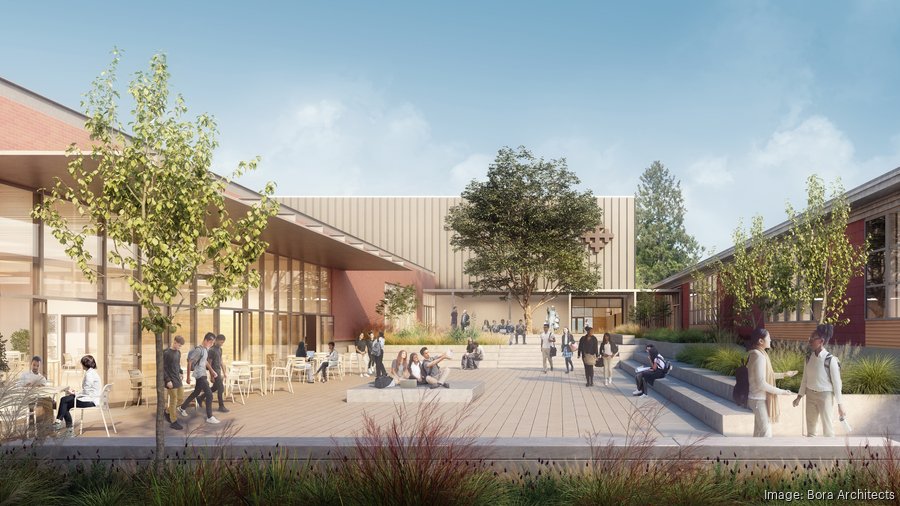
Looking forward, though, Leong is optimistic and sees an opportunity as companies search for ways to support the Black Lives Matter movement and create more inclusive and diverse workplaces.
“There has been a lot of press about social media posts by companies (regarding BLM); and here we are. I’m raising my hand for our community, said Leong. “We are here, and we want to work with you.”
The school student body is the “Portland not seen in Portlandia,” Leong noted. Thirty-eight percent of students are Hispanic, 33 percent are African American, 10 percent are Caucasian, 8 percent are multiracial and 3 percent are Asian. Though it is a Catholic school, only 34 percent of students are Catholic.
At a time when companies are professing support for Black, indigenous, people of color, partnering with DLSNC through its work-study program could be an avenue to do that.
This year, for the first time students won’t be heading into offices for work, at least not at the start of the year. The school is relying on partners to continue their financial support and to help the school develop work plans for students. Some companies, such as OnPoint and Nike, have already committed for fall, and others, like software maker Zapproved have signed on for the spring. (Scroll down to see more about pivoting work study for Covid.)
Leong said the school will work to secure the financial resources necessary to ensure that no student will be turned away, even as partnerships and the revenue they generate decline.
OpenSesame’s Blank said there was never a question about continuing the partnership with DLSNC. The company plans to offer the same support to students who will work from home as it has to existing employees. This includes helping with Internet and supplying company laptops.
Blank said even though OpenSesame is facing its own challenges amid the pandemic, the opportunities provided through the DLSNC partnership are too valuable to be sidelined.
“We are fully invested in trying to improve ourselves and our community,” he said. “We have an obligation to expose students to careers in tech who might not have ever thought about that — their parents don’t work in tech or they haven’t had the advantages some of us had growing up. It needs more investment and attention. ... Tech careers are definitely one avenue to build wealth and exposing students to that is important.”
A Forever Home
De La Salle North Catholic High School is building a new campus at St. Charles Parish in Northeast Portland. In March it completed a $20.5 million capital campaign that was started in April 2019 for pay for the main campus. The school is now raising $3.6 million to build its own gym.
The gym is especially important, said Principal and President Oscar Leong. It will house the school’s boys and girls basketball teams and volleyball. DLSN boys basketball team has won back-to-back state championships, and they've done it without a home gym.
So far, the school has raised $1.2 million for the gym.
DLSN’s current lease for its North Fenwick campus is up in July 2021. So the new school must be completed for the Fall 2021 term, said Leong.
“We are a little behind schedule. We wanted to break ground in May. We are working with the city of Portland,” said Leong. “We had extra time already in the timeline. I wish we had more time, but I think we will be OK.”
The new campus is leased for 100 years, ensuring the school won’t need to move again.
It will also allow the school to expand enrollment. Currently, it has 275 students. With the new campus the school could accommodate 350 to 375 students, Leong said. DLSN typically receives about 150 applications for 85 to 100 slots.
“It’s time for us to grow,” he said.
Covid-19 Pivot
Like other schools across Portland, De La Salle North Catholic is going virtual this fall. But the switch will disrupt more than classroom time for DLSN students.
As part of a unique work-study program, DLSN students in all grades are employed by area companies, gaining real-world work experience and building a professional network, while also earning a paycheck.
To start, students will do a two month long remote on-boarding with their assigned companies. This will allow students, employees and managers to get to know each other and talk about the industry and career paths, said Lisa Creamer, DLSN director of corporate relations.
The new plans are being introduced to companies and so far the response has been positive.
Once restrictions ease, and students return to school, there will be the option to go into offices or work remotely. Students who work remote will have an area on campus to work from, Creamer said.
Fifty percent of DLSN's budget hinges on the work-study program, and the school has lost partners due to Covid. Some partners are paying the school for the students’ work as usual and expect to bring students on board when the time comes. Others, who are not able to host students, are still supporting the school financially to help cover tuition.
“Obviously, it’s not ideal but it gives us time to get to know (the partners) and how we can make this work,” she said. “We have partners willing to be flexible and go through this with us.”
She noted, that when this is over everything learned through the pandemic about remote learning, remote work and how to handle change and uncertainty will “only make the kids more resilient and ready for their future.”
Correction/Clarification
Oscar Leong is president at De La Salle North Catholic High School. An earlier version of this story identified him as principal as well. The principal is Tim Joy.
